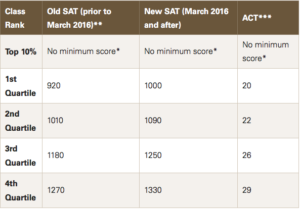When Is Another SAT or ACT Unnecessary?
 Earlier this week I got an email from a friend asking what her senior son needed to do about the ACT. He was scheduled to take the exam this Saturday, which also happens to be homecoming. (No thanks to the school administrators who thought it was a good idea to schedule homecoming on the first ACT test date of the school year!)
My friend’s son took the SAT last spring and made an 1150. Should he push to take the ACT this Saturday and forgo some homecoming festivities or focus on October test dates with the option of doing additional test prep?
My answer might surprise you.
I told her to forget testing. Let him go out and have fun with his friends for his senior year homecoming and don’t bother taking the test again in October.
You see, additional testing isn’t always necessary, or recommended.
Earlier this week I got an email from a friend asking what her senior son needed to do about the ACT. He was scheduled to take the exam this Saturday, which also happens to be homecoming. (No thanks to the school administrators who thought it was a good idea to schedule homecoming on the first ACT test date of the school year!)
My friend’s son took the SAT last spring and made an 1150. Should he push to take the ACT this Saturday and forgo some homecoming festivities or focus on October test dates with the option of doing additional test prep?
My answer might surprise you.
I told her to forget testing. Let him go out and have fun with his friends for his senior year homecoming and don’t bother taking the test again in October.
You see, additional testing isn’t always necessary, or recommended.
Background Information
First, my friend and her son have undergone considerable upheaval in their personal lives over the past few years. Test scores, or even college admission, haven’t been the family’s primary focus. The son took the SAT, new format, last spring and scored an 1150. He would like to attend Texas State University in San Marcos, Texas. Here is where a little research can really pay off. Texas State, like many of the state universities here in Texas, has standards for automatic admission based on class rank and test scores. Before I could advise my friend on how to proceed with the ACT or SAT, it would help to know her son’s class rank. He is in the second quarter of his graduating class. Here is what anyone could find on the Texas State admissions website: [caption id="attachment_3934" align="aligncenter" width="300"] Texas State University Automatic Admission 2016[/caption]
You can see that a student in the second quarter needs the following scores for automatic admission:
Texas State University Automatic Admission 2016[/caption]
You can see that a student in the second quarter needs the following scores for automatic admission:
Old SAT (reading plus math): 1010
New SAT: 1090
ACT: 22
So with no further testing this student with his 1150 on the new SAT already meets the entrance requirements for Texas State University. Additional testing wasn’t necessary. This student could enjoy homecoming weekend and use the time he may have studied for the October ACT to complete his applications. What high school kid doesn’t have something better to do than take a standardized test?!!When Is Another SAT or ACT Unnecessary
Obviously, the story of my friend’s son clearly shows additional testing was unnecessary. Here are some times where I would pass on the extra ACT or SAT:- When a student has met the criteria for automatic admission at his or her top choice school.
- When a student has taken the exam three times and has already devoted significant time and effort to studying and test preparation.
- When a student has exhausted all reasonable means of score improvement and sees little opportunity for improvement in taking the test again. (In other words, taking a class, working with a tutor, or studying more doesn’t offer much hope for improved scores.)
- When time and energy are limited and a student has to choose between efforts spent on the application and effort spent on retesting. Typically this applies to seniors trying to do everything in the fall when a choice has to be made to prep for another test or work to develop a strong application because the student can’t do both.
When Is Another ACT or SAT Recommended
Because it can be a judgment call to take the ACT or SAT for a second, third, or possibly fourth time, here are some things to consider. One more test is recommended:- When a student is close to the score needed for one of his or her top choice schools. For me, close is up to 3 points on the ACT or up to 150 points on the SAT.
- When the student is a junior and has only attempted one standardized test.
- When standardized test scores are noticeably lower than a student’s grades. Another way of saying when the test scores draw attention to themselves because they are out of character with the rests of the application.
- When a student would benefit from higher scores and hasn’t put much effort into score improvement.
- When the student wants to retake. Even if actually unnecessary for admission, this test is more about the student working to achieve a personal goal.